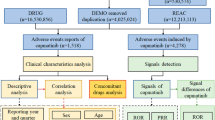Abstract
Purpose
Immune checkpoint inhibitors are a new class of cancer drug that spawn unusual adverse events that generate unusual and sometimes unexpected adverse events. Despite databases that track such adverse events, there remains a need to also generate systematic reviews to capture side effects from such agents.
Findings
We generated a systematic compendium of adverse event reports. Extensively reviewing the published literature of case reports and case series, we relied on the peer process to compile a resource for clinicians of rare adverse events associated with checkpoint inhibitors. We used this compendium as a platform to provide broad-based comments on the role of systematic reviews in gathering such adverse event data. This approach generated 265 types of rare adverse events that had been reported, the most frequent of which were autoimmune type I diabetes (n = 62), pneumonitis (n = 40), myocarditis (n = 39), and colitis (n = 36). More unusual adverse events were also catalogued. Some adverse events that initially seemed unusual turned out to be more frequently reported over time and thus lost their novelty—an important point which provides context for how adverse events should be viewed when new drugs become available. Additionally, in contrast to such resources as the FDA Adverse Event Reporting System (FAERS), this systematic review relied on peer-reviewed data—another important point which adds strength to such systematic reviews.
Summary
This report provides a compendium of rare and usual adverse events, serves as a resource to cancer clinicians, and appears to be justified based on the reported findings.
Similar content being viewed by others
Data Availability
Available upon reasonable request.
Change history
01 July 2021
A Correction to this paper has been published: https://doi.org/10.1007/s11912-021-01101-2
References
Haslam A, Prasad V. Estimation of the percentage of US patients with cancer who are eligible for and respond to checkpoint inhibitor immunotherapy drugs. JAMA Netw Open. 2019;2:e192535.
Herzberg B, Campo MJ, Gainor JF. Immune checkpoint inhibitors in non-small cell lung cancer. Oncologist. 2017;22:81–8.
https://www.cancer.org/latest-news/facts-and-figures-2020.html. Last Accessed March 24, 2020.
Smit HJM, Aerts J, van den Heuval M, et al. Effects of checkpoint inhibitors in advanced non-small cell lung cancer at population level from the National Immunotherapy Registry. Lung Cancer. 2020;140:107–12.
Moher D, Liberati A, Tetzlaff J, et al. Preferred reporting items for systematic reviews and meta-analyses: the PRISMA statement. PLoS Med. 2009.
Murad MH, Sultan S, Haffar S, et al. Methodological quality and synthesis of case series and case reports. BMJ Evid Based Med. 2017;23:2.
Barone A, Hazarika M, Theoret MR, Mishra-Kalyani P, Chen H, He K, et al. FDA approval summary: pembrolizumab for the treatment of patients with unresectable or metastatic melanoma. Clin Cancer Res. 2017;23:5661–5.
Percik R, Shoenfeld Y. Checkpoint inhibitors and autoimmunity: endocrinopathies and susceptibility. Best Pract Res Clin Endocrinol Metab. 2020; in press;34:101411.
Author information
Authors and Affiliations
Corresponding author
Ethics declarations
Conflict of Interest
The authors declare no competing interests.
Human and Animal Rights and Informed Consent
This work did not require human and animal rights and informed consent review procedures.
Additional information
Publisher’s Note
Springer Nature remains neutral with regard to jurisdictional claims in published maps and institutional affiliations.
The original online version of this article was revised: A mistake in the article title. It should read “Programmed Death-Ligand 1 Inhibitors,” not “Programmed Death-1 Ligand Inhibitors”".
This article is part of the Topical Collection on Palliative Medicine
Supplementary information
ESM 1
(XLSX 173 kb).
Rights and permissions
About this article
Cite this article
Smith, C.J., Almodallal, Y. & Jatoi, A. Rare Adverse Events with Programmed Death-1 and Programmed Death-Ligand 1 Inhibitors: Justification and Rationale for a Systematic Review. Curr Oncol Rep 23, 86 (2021). https://doi.org/10.1007/s11912-021-01089-9
Accepted:
Published:
DOI: https://doi.org/10.1007/s11912-021-01089-9




